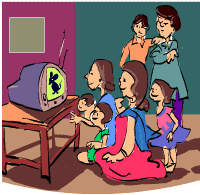It is often felt that children are voracious and unselective viewers of television who spend a considerable part of their free time in front of television sets. Television has become an integral part of our day-to-day life. It is baby sitter, companion and an important agent of socialisation for children.
Television in these conditions is bound to have its tremendous impact on children, both in terms of how many hours and what s/he watches on television. You might say, oh that’s ridiculous! Television is not harmful; it just entertains. You will get your answer if you observe a child watching television.

Television Watch [Illustration by Shinod AP]
There are several things a parent needs to keep in mind regarding the effects of television watching on children (and adults as well):
- Does the whole family watch television together, or does the child engage in a high degree of unregulated viewing?
- Does the television comprise a central piece of furniture in your house?
- Is the television set switched on the moment any member of the family enters an empty house?
- Is it on during the daytime?
- Are television sounds an integral part of your family landscape?
- Can your own television-watching habits be held up as a role model stressing the positive effects of selective viewing for the child?The following suggestion for parents given by American Academy of Paediatrics (AAP) offers suggestions to parents, which can help curtail the impact of the passive medium on the child:
- Know how much television your child watches, and don’t be afraid to reduce it. The AAP recommends that parents limit their children’s viewing to one or two hours per day. Make a firm weekly plan of what programmes will be watched and how much time may be spent on watching television.
- Any child’s weekly schedule normally involves a certain amount of time for school, naps, outdoor and indoor play. There should not be a great amount of unfilled time when the child gravitates towards television.
- Try to watch television with your children, and discuss the programmes they watch. Especially talk about the difference between real life and life on the small screen.
- Be a role model because children often follow their parents’ example. Examine your own viewing patterns to help children decide their own viewing schedule. The rules about television viewing are to be followed by everyone in the family.
- Parents can demonstrate to their children that television is a medium to be used selectively. They can quite literally point children in the direction of informative and educational programmes. There are remarkable things for children to see and enjoy on television.
- Do not use television as a baby-sitter. Instead, offer children alternative activities such as outdoor play, or household chores made interesting, or reading.Since television is here to stay, we need to be fully aware of its possibilities and limits. And, in the final analysis, parents must realise that they have a choice not watching television. For, there is an ‘Off’ button on every set.










